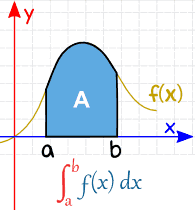\(\int_{0}^{2\pi}\theta sin^6\theta cos\theta\,d\theta\) is equal to
- \(\frac{\pi}{6}\)
- \(\frac{3\pi}{16}\)
- \(\frac{16\pi}{3}\)
- 0
The Correct Option is D
Approach Solution - 1
Integral Symmetry and Evaluation
Integral Equality: The equality $ \int_0^{2a} f(x)\,dx = 2 \int_0^{a} f(x)\,dx $ holds when the function satisfies $ f(2a - x) = f(x) $.
Zero Integral Equivalence: The integral $ \int_0^{2a} f(x)\,dx = 0 $ if the function satisfies $ f(2a - x) = -f(x) $.
Given: $ I = \int_0^{2\pi} \frac{a - b\cos\theta}{2\sin\theta\cos\theta} \, d\theta $
To test symmetry, evaluate $ f(2\pi - \theta) $:
$ f(2\pi - \theta) = \frac{a - b\cos(2\pi - \theta)}{2\sin(2\pi - \theta)\cos(2\pi - \theta)} = \frac{a - b\cos\theta}{-2\sin\theta\cos\theta} = -f(\theta) $
Conclusion: Since $ f(2\pi - \theta) = -f(\theta) $, the function is odd about $ \pi $, and the integral over $ [0, 2\pi] $ is therefore:
$ I = 0 $
Final Answer: Option (D): 0
Approach Solution -2
Evaluation of the Integral
Given: $ \int_{0}^{2\pi} \theta \sin^6\theta \cos\theta \, d\theta $
Step 1: Integration by Parts
Let $ u = \theta $ and $ dv = \sin^6\theta \cos\theta\, d\theta $. Then:
$ du = d\theta $
We now compute $ v = \int \sin^6\theta \cos\theta \, d\theta $
Step 2: Substitution
Let $ t = \sin\theta $, then $ dt = \cos\theta\, d\theta $
So the integral becomes:
$ v = \int t^6\, dt = \frac{t^7}{7} + C = \frac{\sin^7\theta}{7} + C $
Step 3: Apply Integration by Parts Formula
$ \int u\, dv = uv - \int v\, du $
So,
$ \int_{0}^{2\pi} \theta \sin^6\theta \cos\theta \, d\theta = \left[\theta \cdot \frac{\sin^7\theta}{7} \right]_{0}^{2\pi} - \int_{0}^{2\pi} \frac{\sin^7\theta}{7} \, d\theta $
Step 4: Evaluate the Boundary Terms
$ \sin(0) = \sin(2\pi) = 0 $, so the first term becomes 0.
Thus the integral becomes:
$ -\frac{1}{7} \int_{0}^{2\pi} \sin^7\theta \, d\theta $
Step 5: Analyze the Integral
Since $ \sin^7\theta $ is an odd power of the sine function, and sine is periodic with zero average over $ [0, 2\pi] $, we have:
$ \int_{0}^{2\pi} \sin^7\theta \, d\theta = 0 $
Final Answer:
$ \int_{0}^{2\pi} \theta \sin^6\theta \cos\theta \, d\theta = 0 $
Correct option: (D)
Top Questions on Definite Integral
- Evaluate the definite integral: \( \int_{-2}^{2} |x^2 - x - 2| \, dx \)
- MHT CET - 2025
- Mathematics
- Definite Integral
- For \( x \in \left( -\frac{\pi}{2}, \frac{\pi}{2} \right) \), if\[y(x) = \int \frac{\csc x + \sin x}{\csc x \sec x + \tan x \sin^2 x} \, dx\]and\[\lim_{x \to -\frac{\pi}{2}} y(x) = 0\]then \( y\left(\frac{\pi}{4}\right) \) is equal to
- JEE Main - 2024
- Mathematics
- Definite Integral
- The value of the integral \[ \int_{-1}^{2} \log_e \left( x + \sqrt{x^2 + 1} \right) \, dx \] is:
- JEE Main - 2024
- Mathematics
- Definite Integral
The value \( 9 \int_{0}^{9} \left\lfloor \frac{10x}{x+1} \right\rfloor \, dx \), where \( \left\lfloor t \right\rfloor \) denotes the greatest integer less than or equal to \( t \), is ________.
- JEE Main - 2024
- Mathematics
- Definite Integral
- The value of \(\lim_{{n \to \infty}} \sum_{{k=1}}^{n} \frac{n^3}{{(n^2 + k^2)(n^2 + 3k^2)}}\) is
- JEE Main - 2024
- Mathematics
- Definite Integral
Questions Asked in WBJEE exam
- Figure shows the graph of angle of deviation \( \delta \) versus angle of incidence \( i \) for a light ray striking a prism. The prism angle is

- WBJEE - 2025
- Refraction Through A Prism
- Ruma reached the metro station and found that the escalator was not working. She walked up the stationary escalator with velocity \( v_1 \) in time \( t_1 \). On another day, if she remains stationary on the escalator moving with velocity \( v_2 \), the escalator takes her up in time \( t_2 \). The time taken by her to walk up with velocity \( v_1 \) on the moving escalator will be:
- WBJEE - 2025
- Relative Motion
- The compound(s) showing optical activity is/are
- WBJEE - 2025
- Stoichiometry and Stoichiometric Calculations
Which of the following statement(s) is/are correct about the given compound?

- WBJEE - 2025
- Organic Chemistry
- X is an extensive property and x is an intensive property of a thermodynamic system. Which of the following statement(s) is (are) correct?
- WBJEE - 2025
- Thermodynamics
Concepts Used:
Definite Integral
Definite integral is an operation on functions which approximates the sum of the values (of the function) weighted by the length (or measure) of the intervals for which the function takes that value.
Definite integrals - Important Formulae Handbook
A real valued function being evaluated (integrated) over the closed interval [a, b] is written as :
\(\int_{a}^{b}f(x)dx\)
Definite integrals have a lot of applications. Its main application is that it is used to find out the area under the curve of a function, as shown below:
